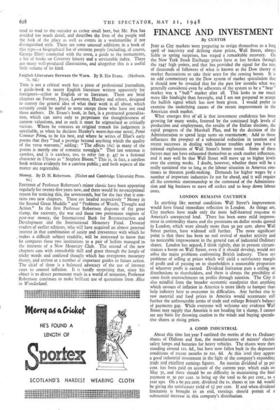FINANC1 AND INVESTMENT By CUSTOS JUST as City markets were
preparing to resign themselves to a long spell of inactivity and drifting share prices, Wall Street, always liable to spring surprises, has staged a remarkable recovery. On the New York Stock Exchange prices have at last broken through the 1947 high points, and that has provided the signal for the tens of thousands of folloWers of what is known as the Dow theory of market fluctuations to take their seats for the coming boom. It is an odd commentary on the Dow system of market speculation that it should now be revealed that for the past few months what was generally considered even by adherents of the system to be a " bear " market was a " bull " market after all. This looks to me much more like hindsight than foresight, and I am not prepared to accept the bullish signal which has now been given. I would prefer to examine the underlying causes of the recent improvement in the American stock market.
What emerges first of all is that investment confidence has been growing for many weeks, fostered by the continued high levels of production and employment, the results of the Italian elecions, the rapid progress of the Marshall Plan, and by the decision of the Administration to spend large sums on rearmament.- Add to those influences the prospect of a substantial reduction in taxation and recent successes in dealing with labour troubles and you have a rational explanation of Wall Street's better trend. Some of these factors may not have exhausted themselves as stock market influences, and it may well be that Wall Street will move up to higher levels over the coming weeks. I doubt, however, whether there will be a really sustained rise so long as the labour situation in America con- tinues to threaten profit-making. Demands for higher wages by a number of important industries lie not far ahead, and it will require all the economic statesmanship at the command of the Administra- tion and big business to stave off strikes and to keep down labour costs.
LONDON REMAINS CAUTIOUS In anything like normal conditions Wall Street's improvement would have found immediate reflection in London. As things are, City markets have made only the most half-hearted response to America's unexpected lead. There has been some mild improve- ment in commodity shares and the premiums on dollar stocks quoted in London, which were already more than 3o per cent. above Wall Street parities, have widened still further. The more significant point is that there has been no real revival of market activity and no noticeable improvement in the general run of industrial Ordinary shares. London has argued, I think rightly, that in present circum- stances a boom on Wall Street, even if it should develop, would not solve the major problems confronting British industry. These are problems of selling at prices Which will yield a satisfactory margin of profit and of passing on to shareholders a reasonable proportion of whatever profit is earned. Dividend limitation puts a ceiling on distributions to shareholders, and there is always the possibility of some fresh encroachments on profits through taxation. The City is also mindful from the broader economic standpoint that anything which savours of inflation in America is more likely to hamper than help industry here to overcome its difficulties. Any further rise in raw material and food prices in America would accentuate still further the unfavourable terms of trade and enlarge Britain's balance of payments gap. While everyone will welcome any evidence Wall Street may supply that America is not heading for a slump, I cannot see any basis for throwing caution to the winds and buying specula- tive shares at rising prices.
A GOOD INDUSTRIAL About this time last year I outlined the merits of the is. Ordinary shares of Oldham and Son, the manufacturers of miners' electric safety lamps and batteries for heavy vehicles. The shares were then standing around in. 6d., but have now fallen back in the depressed conditions of recent months to Ios. 6d. At this level they appear a good industrial investment in the light of the company's expanding trade and excellent earnings figures. An interim dividend of 3o per cent. has been paid on account of the current year, which ends on May 31, and there should be no difficulty in maintaining the final payment at 30 per cent. to bring up the total to 6o per cent., as a year ago. On a 6o pericent. dividend the is. shares at ios, 6d. would be giving the satisfactory yield of 5f per cent. If and when dividend limitation is brought. to an end, earnings should permit of a substantial increase in this company's distribution.


































 Previous page
Previous page